Death in Bucha's Gray Zone, part 1: Defended with Artillery
May 29, 2022
(rough, incomplete)
updates June 3
Mayor Fedoruk on Crisis Response
On April 8, Ukrayinska Pravda's Olga Kirilenko spoke with Bucha Mayor Anatoliy Fedoruk in an interview (in Ukrainian) that sheds some light on what happened in Bucha during the Russian occupation of March. Kiev's efforts to defend the city's residents from harm failed to stop Russian brutality of all kinds, blamed for taking the lives of some 400 residents. This overlooked interview offers some insights into how that was only inevitable.
Even before the Russians first arrived in Bucha on the 26th or 27th of February, the city leadership and defenses were getting out. As Fedoruk explained, by "the second day of the war" (the 25th - just after the Russians first arrived in Bucha) "district structures - district state administration, military enlistment office, other state bodies left Bucha, went to Belogorodka within the district, where it was safer." These places are a ways to the south - see map below). "The military registration and enlistment office left" as well, he says, "taking the weapons meant for local defenders." Furthermore, "some of our active citizens" who enlisted in the defense "then went to Kapitanivka, then to Belogorodka, some went to the defense of Irpen."
After all this, Fedoruk says, "we were actually left with the hromada (community) alone." He says "we" because he and some aides remained, from the thwarted Russian advances of late February to their harried retreat the end of March - mostly. "I was in the city during the whole period of occupation - it is my duty as an official and as a citizen," he told Kirilenko.
- There was a Teroborona in the city, did you create it on the fly?
- We started creating it before the war. The premises for repairs have just been identified - this is a former military unit. But on the second day of the war, the district structures - the district state administration, the military registration and enlistment office, and other government agencies left Bucha..."
The interesting part:
"I then asked the military if we would have an Armed Forces. It was explained to me that, given Kyiv's defense mission, Bucha is a gray zone. Therefore, the Armed Forces will defend us exclusively with artillery and other similar means to prevent the enemy from crossing the Irpin River."
"Of course, having received this information as a historian by profession, I understood the consequences, but I did not spread it, so as not to cause panic."
- So you already knew then that the city will actually be destroyed?
- [Not quite] destroyed… I understood perfectly well what the gray zone is, given the events in the east of our state."
The last part refers to the Donbas since 2014, where Ukrainian forces terrorized the locals for declaring independence, regularly launching rockets and missiles on civilians from a distance and then denying it. Fedoruk would challenge that characterization, but either way, he realized Bucha would become a gray zone like Donetsk or Lugansk.
The interviewer Kirilenko raised an important question: "why, having learned about the city's stay in the "gray zone", you did not begin forced evacuation?" The mayor explained "we wondered how to act. The regional and district leadership said that Russian troops would not enter Bucha." Then he changed the subject. This remains an open question of some importance.
I've been noting the effects of this defense policy at this blog, only sensing that it seemed like a policy. See especially the "mortar alley" post; people allegedly shot by the Russians along the exposed no-man's land of Yablunska street tend to be clustered around the craters of artillery largely fired from the Ukrainian-controlled southeast.
Such attacks sometimes hit Russian forces and civilians or their infrastructure at the same time, but over and over, the latter was blamed on Russian forces. For example, when a bright young girl lost her arm and some of her family in the shelling of Bucha, it was due to "Russian bombardments" (Viktor Kovalenko on Twitter), not due to "Kyiv's defense mission" that did all its work with explosive shells. That might be the case, but how that was decided is never explained.
Mainstream news reports were late to acknowledge the issue in any form, but finally on April 18 and 24 the Washington Post and The Guardian reported how "fléchettes" or tiny darts were found in "dozens" of those killed in Bucha and the surrounding areas. These were said to be dispersed from artillery shells fired by the Russians, "a few days before" those Russians left Bucha under attack at the end of March. That probably doesn't include the same shelling in early March I've covered, and little detail is given as to just where these dart attacks even happened, let alone how. But the Post reported how resident Svitlana Chmut "found the projectiles in her car the morning of March 25 or 26, she said, after a night of intense shelling on both sides. It’s not clear if Russian troops were wounded by their own shell. The soldiers set up artillery positions and parked tanks in yards near Chmut’s home..."
Mayor Fedoruk had earlier downplayed shelling in favor of shooting as the main cause of death in Bucha. "A Ukrainian official told AFP the dead men could have been killed in a bombardment or shot by Russian soldiers, and police would investigate. But the town's mayor, Anatoly Fedoruk, told AFP by phone that all of the 20 dead [along mortar alley on Yablunska street] had been shot in the back of the head. He added that other bodies still lay inside the wrecks of cars destroyed by shelling," and were presumably killed by that shelling. (BBC) But no one outside a car ever was?
Fedoruk had said similar to the Kyiv Independent, a bit less categorically: "The Russians had a citywide shooting spree in Bucha. According to Fedoruk, over 80% of the bodies have bullet wounds, largely in the head and torso." City council member Taras Vyazovchenko expanded on this, telling the Independent “If in Irpin (a city next to Bucha) people died from fragments caused by shelling and mortars, in addition to being shot, then in Bucha people were mainly just shot, ... There are practically no accidental hits among the victims.” Why would a Russian artillery strike on civilians be an "accident"? He'd say Ukraine would only kill locals on accident, as they "defended" the city with artillery shells, but that "practically" never happened.
On review of the evidence, there were likely hundreds of injuries like that girl suffered, and perhaps hundreds of fatalities following directly on the Ukrainian decision to "defend" Bucha with artillery. All of these, most likely, have been re-branded as Russian shelling, Russian shooting, and Russian other violence. And while there surely were at least a few deaths caused by Russian forces, intentionally or not, this denied collateral damage might well comprise the vast bulk of those "massacred" by "the Russians," or anyway killed "during the Russian occupation."
Tallying the Costs
Looking back on a month of Russian crimes and Ukrainian defense, Fedoruk gave some assessment of the losses, human and otherwise.
"From April 5, we calculate the extent of damage to high-rise buildings, as far as it can be done visually. That is, whether they are subject to repair or demolition. To date, we note that 20 high-rises out of 186 were subjected to artillery shelling. We are talking about those houses where everything was dumped. If somewhere the apartment burned down, something hit, it does not mean that it is (full-scale - UE) damage."
By this, some 20 building suffered total losses and will need rebuilt, wile unclear others will just need some repairs. Bucha has had a lot of new, well-financed high-rises in the years since the Maidan revolution. Many come in easter egg colors and clustered into little magical sub-worlds that are nice to look at. Bucha has not as many of these as neighboring Irpin, and they suffered perhaps less damage, but still the shelling took some toll. One example is the Continent complex - a reasonably new and fancy housing and retail center in the east center of Bucha: Google Maps
We see only light shelling here at the north parking lot - a dead man was seen to the northwest in the same parking lot, alongside an electrical station, laying near some flying car pieces and maybe primary explosive fragments that killed him. A wall of the station ahead is toppled - that plus damage to north faces of the buildings suggests this shelling was from the north, which tends to implicate Russian forces, depending when it happened and how that lines up with the control situation then, neither of which is clear to me. (images correlated).For what it's worth, this might open the way to some redevelopment towards the more prized model of pretty high-rises. But the main point was to stop the Russian advance, or anyway to kill them and wreck their armor, and maybe to block this most direct route to prevent them trying that crossing again.
- How many civilians died in the city during the occupation?
- As of April 6, we have stated the death of 320 civilians. There is not a single soldier among those who were shot and tortured by Russian troops. The final information will be a little later, we will cover everything. ... So far, 163 citizens have been identified,
That sounds like 320 civilians died - later expanded to past 400 - and all of them were killed by Russian violence. Shooting and torture are specified. Shelling by them or anyone isn't mentioned. So whatever cost there is still to pay, Russia will have to pay it all, if that can be helped. If Kiev can evade all blame for its decisions, that lessens the motive to weigh options carefully and minimize damage. In fact having deaths and destruction to hang on Russia in the information war might even bring adequate motive to increase the collateral damage - especially for some more extreme elements in Ukraine's ever-expanding armed forces, and especially if that killing could be directed to Ukrainians they'd rather see dead anyway. Those are not just hypothetical thoughts.
The Line that was Drawn
The UP interviewer got the impression "most of those shot are those who wanted to evacuate, but did not have time to do so," which Fedoruk affirmed: "They wanted to, yes." But they couldn't leave because most of the river crossings to escape by were destroyed by the end of February. That was caused by Russian bombing in some accounts, but it was probably by Kiev in all cases, including a rail line only suitable for pedestrians to cross. The following infographic looks at six crossings to the west of Kyiv.
Part 2 will look at the late-February halting of Russia's advance that first set the tone of this gray zone, including the northernmost attack here, on the E373. Other crossings. notably to southeastern Bucha, were blocked by Kyiv or left unclear. This is the gate that was dropped, leaving thousands out there "defended" only with artillery, as "Russian shelling" and "Russian snipers" and whatnot impeded their escape, and caused every death that ensued - allegedly.

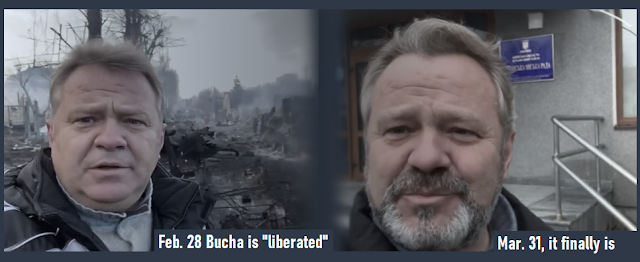


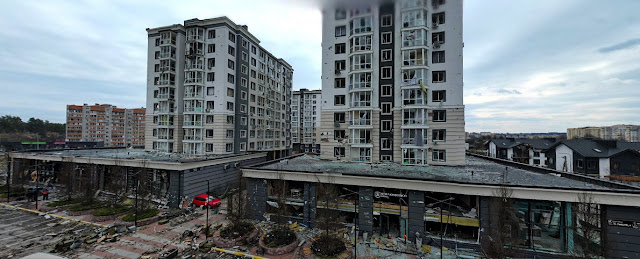

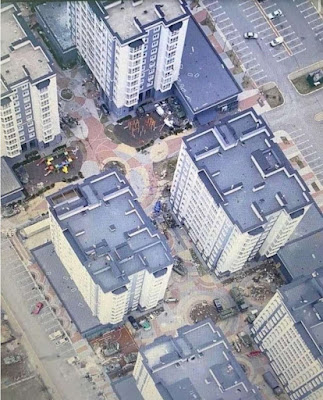
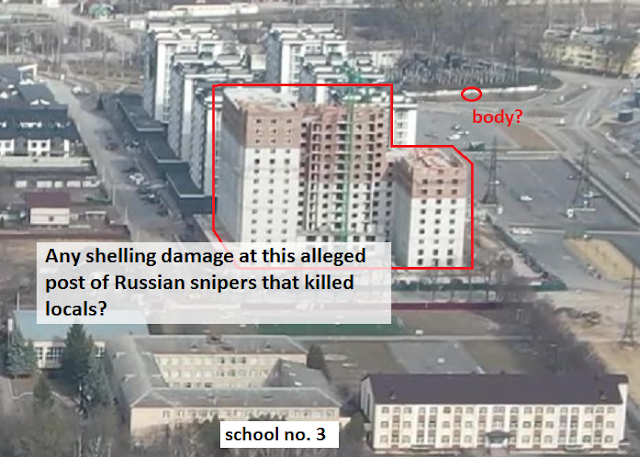


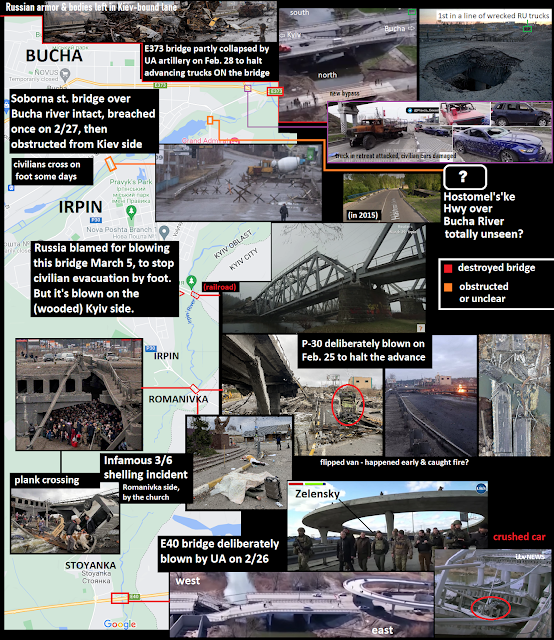
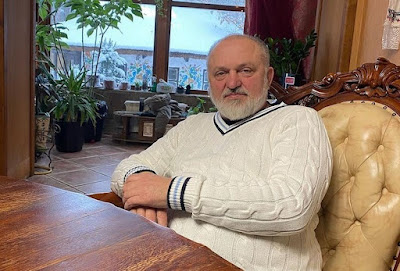




.png)



